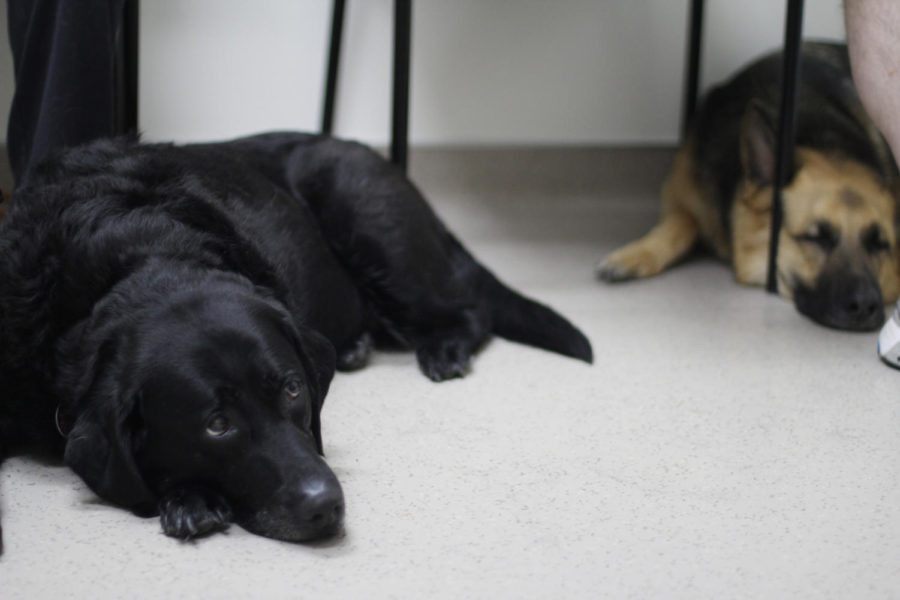Council attempts to better define assistance animal policy
Photo: Brian Achenbach/Iowa State Daily
The Gurganus’s dogs wait for a check up during the National Service Dog Eye Exam event in May 2013. The event is put on annually for service dogs by the American College of Veterinarian Ophthalmologists.
April 13, 2015
The ISU Professional and Scientific Council is looking for university feedback to help properly define Iowa State’s current assistance animal policy.
The council’s confirmation for the assistance animal policy draft took place at the April 1 meeting and included a recommendation for defining the term “housing unit” used in the draft policy.
The council is looking for feedback on the policy until April 21. Feedback can be sent to [email protected].
Assistance animals refer to any animal providing accommodations to an individual with a disability. An assistance animal may be a service animal or an emotional support animal. Service animals and emotional support animals are not considered pets, according to the policy.
Service animals are allowed anywhere the individual needing the animal goes. Emotional support animals are restricted to residential areas and are not otherwise permitted inside other university buildings such as: classrooms, dining facilities, recreational buildings, employment areas, libraries, sporting events and research laboratories, according to this policy.
An emotional support animal is to provide comfort that eases someone with a disability, condition or symptom and can be of any species.
A service animal that has been individually trained to do specific work or perform a specific task for an individual with a disability can only be dogs or miniature horses.
Animals are restricted to one per resident and one assistance animal per housing unit.
“Basically in the policy it says assistance animals are allowed to be in housing units. Do you define a housing unit as that one dorm? That one building? That one floor? If you look at Freddy Court, is it defined as that one apartment or the floor of that building?” said Amy Harris-Tehan, president of the Professional and Scientific Council.
Animals are not permitted to enter university buildings unless they are “specially trained for and under the control of an individual with disabilities, used for teaching and research purposes or receiving treatment at the Lloyd Veterinary Medical Center or other approved facility,” according to the animals on campus policy.
The Professional and Scientific Council — which represents different levels of about 2,800 professional and scientific employees on campus — worked with the Policy Library Advisory Committee on the policy draft.
The Policy Library Advisory Committee is a group of individuals across many different faculty, university council, the provost, student affairs and more, Tehan said.
The standpoint for the Professional and Scientific Council is that the assistance animal policy does affect the professional and scientific employees. The policy committee helped get the endorsement the Professional and Scientific Council needed.
Kris Koerner, Policies and Procedures Committee chair for the Professional and Scientific Council, said many people across campus are affected by this policy. She said they wanted to get the Professional and Scientific Council’s endorsement and they went through the whole plan.
Koerner said it wasn’t the policy committee’s responsibility to write the policy. The role now is to ask the Professional and Scientific Council for clarification and inform the council that it should go back and redefine the term “housing unit.”
“We just said, ‘please clarify what housing unit means,'” Koerner said. “The reason we came up with that is the whole committee didn’t really understand what that meant.”
There was no discussion or objections about the policy within the council during the April 1 meeting. Tehan said she thinks it’s going to be smooth sailing for the assistance animal policy.
“Assistance animals are important to a lot of different people and I’m actually kind of surprised that we didn’t have something like this before,” Tehan said. “I kind of assumed that we always had.”
When someone looks to suggest an item of interest, he or she can bring the matter to the policy committee. The process starts with the policy committee with a policy development plan that gets put into place and outlines the policy and those involved with the policy.
“It’s a policy that ‘yes it can benefit people’ but it’s more about the university having something in place that helps what people are already requesting,” Koerner said.
Students who need an assistance animal must go through Student Disabilities Resources and get medical documentation to prove they need to have support from an emotional or assistance animal. The application process for a student would be different from a staff member or faculty member.
“[The] university administration will then have something in place, a process in place, a rule behind in case something happens. There wasn’t anything, so how can you allow something if you don’t have a guideline behind it?” Koerner said. “This is just going to allow the university to have some support and something to refer to as the need comes up.”






